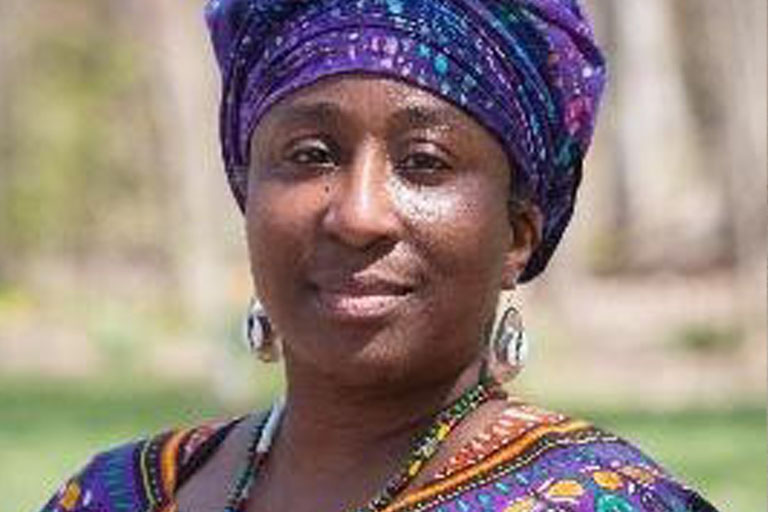COVID-19 continues to impact Indiana University with students being taught virtually while faculty and staff telecommute through programs like Zoom. This sudden shift in higher education has caused anxiety, fear, and even uncertainty in several individuals. However, many members of the IU family are doing their best to provide a sense of balance and tranquility during these times.
Maria Hamilton Abegunde, Ph.D., founding director of the Graduate Mentoring Center and visiting faculty in the Department of African American and African Diaspora Studies, has been hosting the weekly Sitting for Peace meditation virtually. “This is an hour to sit, be still, and understand what it means to be peaceful for you. It doesn’t happen immediately,” Abegunde said. Sitting for Peace allows participants to sit for one hour every Friday and let the tensions and anxieties of the week dissolve as they listen to bowls, bells, soft music, or nature sounds. It is important for us to rest and to become comfortable with ourselves in a different way,” Abegunde said.
Abegunde wanted to continue Sitting for Peace after the COVID-19 pandemic caused most of the IU community to work from home, but ran into an issue fairly quickly. She realized that a pre-recorded video did not allow for the type of engagement necessary for the practice and decided to switch to a live video instead.
“Doing something via Zoom is very different from doing something in person,” Abegunde said. “I had no expectations. I started this new approach untethered to an outcome. The session was well-received, and the participants were very kind and compassionate towards this change.”
Abegunde is also a member of the online community group Humanity for the Win started by Maqubè Reese, assistant director of Diversity Initiatives within the Kelley School of Business. According to Reese, Humanity for the Win “is a space for folks to share how their local communities throughout the world are winning as humans. This space highlights how humanity is winning against all the odds by choosing to show up. There are no restrictions, but participants should focus on the peaceful ways people are filling in the gaps.” Abegunde offered a Facebook Live session on the importance of understanding how to shift our states of being during this time. The video intends to help people understand what is happening to them, and how to move through it – even if it feels like they are on sand.
“Contemplative practices call for us to be aware of what is happening internally and externally, just for today,” Abegunde said. “They invite us to identify and access what works for us. They invite us to breathe. When we can be still, or even walk intentionally, and focus on our breath – one of the things that indicate that we are alive – when we can do this, we can slowly remove tension from our bodies and minds. We can begin to assess our situation, choose how to respond, and embrace where we are or what we can do in the moment. When we can do this, even a little, we can also begin to ask for support.”
Outside of IU, Abegunde is a community and cultural worker and a birth and postpartum doula, with a specialty in memory, trauma, and healing. In addition to these areas, she says that it is also her work as a poet that influences her approach to meditation and contemplative practices. “A poet’s attention is to language, sound, and the sensory. Writing poetry is meditation, and as I am shaping a poem, I listen to it,” Abegunde says. “The sound under the words, the words that want to be visible/audible – they guide me towards creating the poem in the same way that being still and focusing on our breath can guide us towards hearing our thoughts and feelings.”
The importance of acknowledging past and current traumas at this moment has not escaped Abegunde. Right now, for some, it is necessary to articulate present and ancestral traumas and not be imprisoned by them. As humans, we are asked to bear witness to other people in ways we have not done before. Perhaps, it is the first time you are witnessing a friend be frightened, or confused. “Holding space for others, or just holding them, is necessary,” Abegunde said. “In this way – by not putting ourselves or our stories first – we let others know that we see them and that they are alive and loved.”
Yes, the pandemic is genuinely terrifying to individuals. Supporting those who may need a little more help through this difficult time is one of the most important things we can do if able to do so. The Monroe County Mutual Aid for COVID-19 Group, led by Aby Ang and Jessy Tang, is another great example of how IU grad students have created a way for those who can help to do so.
“As we shift – change and transform – into new people, communities, and institutions, it is okay to experience a range of emotions like isolation and fear, gratitude, and joy,” Abegunde said. “It is also okay to ask for help or to offer help so that we all can come out on the other side as a whole as possible. There is no one way to do this. Contemplative practices – in combination with other support such as mental health services through CAPS - help us each determine what we need, when, and how. If nothing else, they can help us stop and listen to the sound of our breathing and heart to know that we are alive together.”


